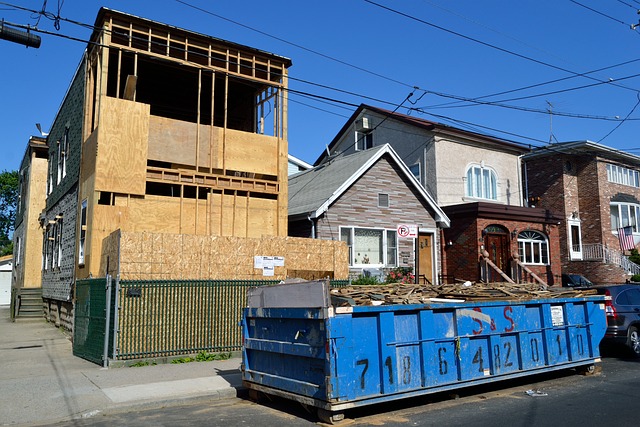Roll Off Fast: Memphis’s Quick 15 Yard Dumpster Delivery for Less
Are you tired of dealing with messy construction sites or overwhelming clutter? Look no further! Our…….
Memphis 40 Yard Dumpster: A Comprehensive Analysis
Introduction
In the realm of waste management, the “Memphis 40 Yard Dumpster” stands out as a pivotal solution for handling large-scale waste disposal. This article delves into the multifaceted aspects of the Memphis 40 Yard Dumpster, exploring its composition, significance, and impact on both local and global scales. We will navigate through its historical context, economic contributions, technological advancements, policy implications, and future prospects. By the end of this exploration, readers will have a comprehensive understanding of this essential component in waste management systems.
Understanding Memphis 40 Yard Dumpster
The Memphis 40 Yard Dumpster is a large-capacity waste receptacle, designed to facilitate the disposal and recycling of substantial volumes of waste material. It measures approximately 22 feet long by 8 feet wide by 6.5 feet high and can hold up to 40 cubic yards of waste. These dumpsters are commonly used by businesses, construction sites, and municipalities for the removal of various types of waste, including but not limited to construction debris, general refuse, and organic matter.
Historically, the concept of a standardized waste collection system has evolved significantly since the early 20th century. The Memphis 40 Yard Dumpster represents a culmination of this evolution, integrating modern materials, design, and environmental considerations. It is a critical component in the broader landscape of sustainable waste management, playing a vital role in maintaining public health and sanitation while minimizing environmental impact.
Global Impact and Trends
The influence of the Memphis 40 Yard Dumpster extends beyond local communities, affecting global waste management practices. The increasing generation of waste due to urbanization, industrial growth, and consumerism has highlighted the necessity for scalable and efficient waste solutions. Trends such as the circular economy model, where waste materials are repurposed into new products, are shaping the trajectory of the industry.
Developed countries with robust waste management infrastructures are adopting smarter technologies to enhance recycling rates and reduce landfill use. Meanwhile, emerging economies are implementing strategies to manage their growing waste streams effectively, often looking to the Memphis 40 Yard Dumpster as a model for scalable waste solutions.
Economic Considerations
The economic aspects of the Memphis 40 Yard Dumpster are multifaceted. It represents a significant capital investment for municipalities and businesses. The cost-benefit analysis of utilizing these dumpsters must consider factors such as waste disposal costs, potential savings from recycling initiatives, and the long-term environmental and economic sustainability of such practices.
Market dynamics in the waste management industry are influenced by regulatory frameworks, technological advancements, and consumer behavior. Investment patterns indicate a growing interest in sustainable waste solutions, reflecting both market opportunities and societal shifts towards environmental stewardship. The role of the Memphis 40 Yard Dumpster is to optimize these economic factors within the waste management ecosystem.
Technological Advancements
Technological advancements in the field of waste management have been instrumental in enhancing the efficiency and sustainability of the Memphis 40 Yard Dumpster. Innovations such as smart dumpsters equipped with sensors to optimize collection routes, GPS tracking for logistics, and automated compacting systems are setting new standards. These advancements not only streamline operations but also contribute to reduced emissions and lower operational costs.
The future potential of technology in waste management is vast. Automation, artificial intelligence, and data analytics are poised to revolutionize the industry, leading to smarter, cleaner, and more efficient waste disposal systems. The integration of these technologies into the Memphis 40 Yard Dumpster will be a critical driver of progress in this field.
Policy and Regulation
A comprehensive understanding of the Memphis 40 Yard Dumpster requires a deep dive into the policies and regulations that govern its use. These include waste disposal laws, environmental protection regulations, and recycling mandates. Policies at the local, state, and federal levels dictate how waste is managed, including the operation of the Memphis 40 Yard Dumpster.
Compliance with these regulations is not only a legal requirement but also a strategic imperative for businesses and municipalities. The legislative framework influences the design, implementation, and scaling of waste management solutions, ensuring that they are environmentally sound and economically viable.
Challenges and Criticisms
Despite its advantages, the Memphis 40 Yard Dumpster faces challenges and criticisms. Issues such as contamination in recyclable streams, logistical inefficiencies, and the environmental impact of waste disposal are areas of concern. Critics also point to the potential for misuse and the need for stricter enforcement of regulations.
Addressing these challenges requires a multifaceted approach that includes technology integration, stakeholder engagement, and policy reform. By continuously evaluating and improving upon current practices, the waste management industry can overcome obstacles and enhance the sustainability and effectiveness of the Memphis 40 Yard Dumpster.
Future Prospects
The future of the Memphis 40 Yard Dumpster is one of innovation and adaptation. As the world grapples with increasing waste streams and the urgency of climate change, the role of these dumpsters will evolve to meet new demands. The integration of smart technologies, advancements in recycling processes, and a focus on circular economy principles will shape the future of waste management.
Moreover, public-private partnerships and increased investment in research and development will drive progress. The potential for the Memphis 40 Yard Dumpster to become an even more efficient and sustainable tool in managing waste is significant, provided it can adapt to changing environmental and economic landscapes.
Conclusion
The Memphis 40 Yard Dumpster stands as a testament to human ingenuity in addressing the challenges of waste management. Its role in maintaining public health, protecting the environment, and contributing to economic sustainability is undeniable. By understanding its history, current state, and potential future developments, we can appreciate the importance of this tool in our collective journey towards a more sustainable world. The evolution of the Memphis 40 Yard Dumpster will continue to be shaped by technological advancements, policy reforms, and societal values, ensuring its place as a cornerstone of modern waste management practices.
Appendix: Case Studies and Data Tables
To provide a more detailed understanding of the Memphis 40 Yard Dumpster’s impact, this report includes case studies from various regions and data tables that illustrate key metrics such as waste disposal costs, recycling rates, and operational efficiencies. These real-world examples and statistical analyses offer valuable insights into the practical application of the Memphis 40 Yard Dumpster and its role in global waste management systems.
FAQs
What is a Memphis 40 Yard Dumpster?
A Memphis 40 Yard Dumpster is a large-capacity waste receptacle used for the disposal and recycling of substantial volumes of waste material, with a capacity of approximately 40 cubic yards.
How does the Memphis 40 Yard Dumpster contribute to sustainability?
The Memphis 40 Yard Dumpster contributes to sustainability by facilitating efficient waste collection, reducing landfill use through recycling, and enabling the integration of smart technologies that optimize routes and operations for environmental and economic benefits.
What are some technological advancements in the waste management industry?
Technological advancements include smart dumpsters with sensors, GPS tracking systems, automated compaction technologies, data analytics for route optimization, and recycling technology enhancements.
How do policies and regulations affect the use of Memphis 40 Yard Dumpsters?
Policies and regulations dictate how waste is managed, including the operation of Memphis 40 Yard Dumpsters. Compliance with environmental protection laws and recycling mandates influences design, implementation, and operational efficiency.
What are some of the challenges faced by the Memphis 40 Yard Dumpster?
Challenges include waste contamination, logistical inefficiencies, potential environmental impact, and the need for stricter enforcement of regulations to prevent misuse.
What is the future outlook for the Memphis 40 Yard Dumpster?
The future outlook for the Memphis 40 Yard Dumpster is one of innovation, with a focus on smarter technologies, circular economy principles, and adapting to changing environmental and economic landscapes to become an even more efficient and sustainable waste management tool.

Are you tired of dealing with messy construction sites or overwhelming clutter? Look no further! Our…….

Tired of the hassle and cost of traditional trash removal after parties and events in Memphis? Look…….

Are you a contractor in Memphis facing space constraints and high removal costs? It’s time to say go…….

???????????????????????????????Save Big in Memphis with 40Y Dumpster!Free Spring Cleaning in TN: 40…….

Are you tackling a remodeling project in Memphis, TN, and struggling with waste removal? Look no fur…….

Declutter your space, upgrade your environment, and manage your waste without breaking the bank wit…….

Declutter your outdoor space effortlessly! Tackle those piles of yard waste with ease in Memphis by …….